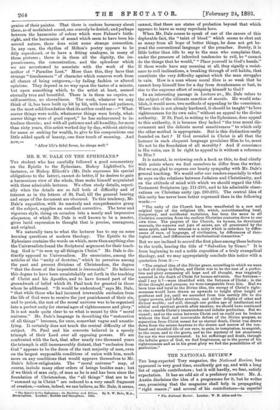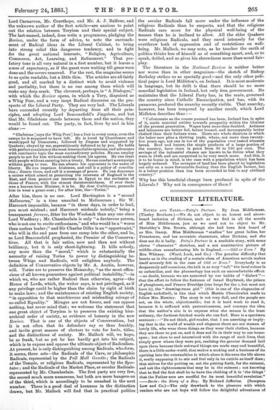THE NATIONAL REVIEW.* THE long-expected Tory magazine, the National Review,
has appeared in very good time, excellently got up, and with a long list of capable contributors ; but it will hardly, we fear, satisfy expectation. It has an odd air of a prefatory number. Mr. A. Austin disclaims the idea of a programme for it, but be writes one, promising that the magazine shall help in propagating " right reason ;" and several of his contributors—in especial
• The National Review. London W. H. Allen and Co. Lord Carnarvon, Mr. Courthope, and Mr. A. J. Balfour, and -the unknown author of the first article—are anxious to point out the relation between Toryism and their special subject.
The last-named, indeed, does write a programme, pledging the
Review, under the form of advice, to note the encroach- ment of Radical ideas in the Liberal Cabinet, to bring
into strong relief this dangerous tendency, and to fight for the great national interests, " Religion, Agriculture, Commerce, Art, Learning, and Refinement." That pre- fatory tone is all very natural in a first number, but it leaves a smse of expectancy, as if the guest were waiting till grace were done and the covers removed. For the rest, the magazine seems to us quite readable, but a little thin. The articles are all fairly
good, and all marked by a distinct wish to avoid violence and partiality, but there is no one among them which will make any deep mark. The cleverest, perhaps, is " A Dialogue," with which the Review opens, in which a Tory, disguised as
a Whig Peer, and a very inept Radical discourse on the pro- spects of the Liberal Party. They are very bad. The Liberals have succeeded recently by departing from all their prin- ciples, and adopting Lord Beaconsfield's Jingoism, and but that Mr. Gladstone stands between them and the nation, they would be found out. The party, in fact, lives by and in him -alone :-
" Gladstone [says the Whig Peer] has a foot in every camp, even the -camps he is supposed to have left. He is loved by Churchmen and worshipped by Dissenters; followed by Jingoes and supported by Quakers; obeyed by me, superstitiously deferred to by you. He holds with perfect consistency tb e most irreconcilable opinions, and advocates with conclusive logic the most contradictory policies. He can employ people to act for him without making them his agents. He can treat with people without entering into a treaty. He can conduct a campaign without going to war. He can silence his opponents in the name of liberty. He can imprison Irishmen, and call it a policy of concilia- tion ; disarm them, and call it a message of peace. He can denounce a course which aimed at protecting the interests of England in the East, and then protect our interests in Egypt to the exclusion of those of France, with the utmost disinterestedness. If ever there was a heaven-born Minister, it is be. -My dear Corkhonse, persuade him to wear a great-coat ; for after him, the—Tories."
After him, there is no one. Lord Hartington is a " second Melbourne," in a time unsuited to Melbournes ; Sir W. Harcourt impossible, because " in these days, in order to lead, you must mislead ; and Harcourt misleads nobody," being a
transparent farceur, fitter for the Woolsack than any one since Lord Westbury ; Mr. Chamberlain is only "a dexterous person,
who is not one to excite enthusiasm," and who would be a " worse than useless leader;" and Sir Charles Dike is an" opportunist," who will in the end pass from one camp into the other, and be, as Lord Beaconsfield prophesied, the Premier of the Conserva- tives. All that is fair satire, now and then not without brilliancy, but it is only sheet-lightning. It kills nobody, any more than the "moral," which is substantially the necessity of raising Tories to power by distinguishing be- tween Whigs and Radicals, will enlighten anybody. The -definition of Conservative objects by Mr. A. Austin, however, will. Tories are to preserve the Monarchy, "as the most effica- cious of all known guarantees against political instability,"—in
which we, who are rather Radical than otherwise, agree—the House of Lords, which, the writer says, is not privileged, as if any privilege could be higher than the claim by right of birth to make laws ; and the maintenance of existing English society, "in opposition to that mischievous and misleading mirage of -so-called Equality." Mirages are not forces, and can oppose nothing, but never mind that ; we welcome the statement that one great object of Toryism is to preserve the existing hier- archical order of society, as evidence of honesty in the new Review. That is one of the objects of Conservatism, but it is not often that its defenders say so thus frankly, and invite great masses of electors to vote for lords, titles, and the distinctions of society. Mr. Mallock will, we hope, be as frank, but as yet he has hardly got into his subject, which is to expose and oppose the ultimate object of Radicalism. At present, he is only distinguishing among Radicals, who form, it seems, three sets—the Radicals of the Cave, or philosophic Radicals, represented by the Pall Mall Gazette; the Radicals of the Temple, or religious Radicals, represented by the Spec- tator ; and the Radicals of the Market Place, or secular Radicals, represented by Mr. Chamberlain. The first party are very few, the second much more numerous, but both are mere hangers-on of the third, which is accordingly to be smashed in the next
number. There is a good deal of keenness in the distinction -drawn, but Mr. Mallock will find that in practical polities
the secular Radicals fall more under the influence of the religious Radicals than he suspects, and that the religious Radicals care more for the physical well-being of the
masses than he is inclined to allow. All the elder Quakers
were religious Radicals, and they cared intensely for the overthrow both of oppression and of restrictions on well- being. Mr. Mallock, we may note, as he touches the earth of politics thinks less of himself as of something apart, and, so to speak, deified, and so gives his shrewdness more than usual fair- play- The literature in the National Review is neither better nor worse than in other magazines—the sketch of Bishop Berkeley strikes us as specially good—and the only other poli- tical paper is Lord Midleton's, on Ireland. It is most moderate in language, but its drift is that there should be no more remedial legislation in Ireland, but only firm government. He maintains that the Liberal Party has, in the main, governed the country since Catholic Emancipation, and has, with its panaceas, produced the anarchy recently visible. That anarchy, however, has been tempered by another result, which Lord Midleton describes thus :— " Unfortunate as the course pursued has been, Ireland has, in spite of it, made material strides towards prosperity within the lifetime of the present generation. Wages have more than doubled. Artisans and labourers are better fed, better housed, and incomparably better clothed than their fathers were. There are whole districts in which the baker now plies a thriving trade, where, not more than twenty- five years ago, not one in ten of the population ever tasted wheaten bread. Beef and butter, the staple products of a large portion of the country, have risen in price from 50 to 130 per cent. The savings of the industrial classes are known to be thrice what they were in 1848, and are suspected to be very much more. And this, it is to be borne in mind, is the case with a population which has been largely reduced. The occupier of land has been placed by legislation not only on a more favourable footing than the English farmer, but in a better position than has been accorded to him in any civilised country."
Why has this beneficial change been produced in spite of the Liberals ? Why not in consequence of them ?



































 Previous page
Previous page